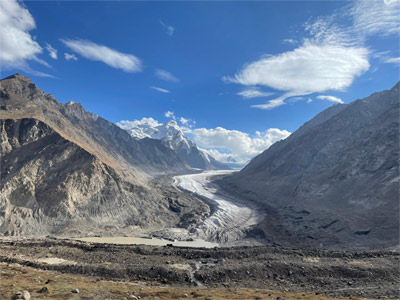
Important Notes Phugtal Trek
These important notes are crucial for ensuring a safe and enjoyable trek to Phugtal Monastery, especially considering the remote and rugged nature of the Zanskar Valley.
Here’s a bit more detail on each of the points you mentioned:
Acclimatization:
Why It's Important: The altitude in the region (Padum at 3,650 meters / 12,000 feet) can lead to altitude sickness if you don't give your body time to adjust. The symptoms of altitude sickness can include headaches, dizziness, shortness of breath, and nausea.How to Manage:
Hydration: Drink plenty of water to stay hydrated, as dehydration can worsen the effects of altitude sickness.
Rest: Take it easy on the first day in Padum to acclimatize before starting your trek.
Avoid Alcohol & Smoking: These can exacerbate altitude sickness.
Watch for Symptoms: If you feel unwell, don’t hesitate to descend or seek medical help.
Physical Fitness:
Trek Difficulty: This trek is moderate to challenging, especially because of the rugged and uneven terrain. Some sections may be steep or difficult to navigate, particularly as you approach the monastery.Prepare: It's a good idea to train before your trip, especially with long hikes or climbs in high-altitude conditions. If you're not used to trekking, try hiking in similar environments to build stamina.
Pace Yourself: The key is not to rush. Start slow, and listen to your body. Rest frequently if needed, especially if you’re feeling winded due to the altitude.
Packing:
Essential Gear:Trekking Shoes: Sturdy, comfortable shoes are essential for navigating the rocky, uneven terrain.
Warm Clothing: Even in summer, the nights can get cold, especially at higher altitudes. Pack layers, including a warm jacket, gloves, and a hat.
Sleeping Bag: If you plan to camp or stay in basic accommodations, a good sleeping bag will help keep you warm at night.
Sun Protection: Sunscreen (SPF 30 or higher), sunglasses with UV protection, and a wide-brimmed hat are important, especially because of the high altitude and UV exposure.
Water Bottles: Carry at least 2-3 liters of water per day. You may need to purify water from streams, so a portable water filter or purification tablets are also useful.
First Aid Kit: Pack a small kit with essentials like bandages, painkillers, antiseptic wipes, blister plasters, and any personal medications you might need.
Guide & Permits:
Guides: Hiring a guide who knows the region is highly recommended. Not only will they help you navigate the trails, but they can also provide insights into the local culture, the monastery’s significance, and safety precautions.Benefits of a Guide: They can assist with communication, especially in remote villages, and help in case of an emergency. They also know the safest routes and where to rest.
Permits: Zanskar Valley is a restricted area, so you will need Inner Line Permits for the trek. You can obtain these permits in Leh or through a trekking agency.
Where to Get Permits: If you're arranging your trek independently, you can acquire the necessary permits in Leh at the DC office or through a local agency.
Permit Fees: The cost of the permits can vary, so it's good to check the latest requirements before your trek.
Additional Tips:
Weather: The weather in the region can change rapidly, so be prepared for sudden temperature drops, especially in the evenings. Carry waterproof gear in case of rain.Mobile Network: There is very little to no mobile network coverage in Zanskar, so make sure you have emergency contact details before heading out.
Food & Water: While trekking, you’ll be able to find simple food and snacks in villages, but it’s good to carry high-energy snacks (like nuts, chocolate, or energy bars) to keep your energy up during the trek.
By keeping these important notes in mind, you’ll be well-prepared for your trek to Phugtal Monastery. Would you like additional advice on any specific part of the trek.


